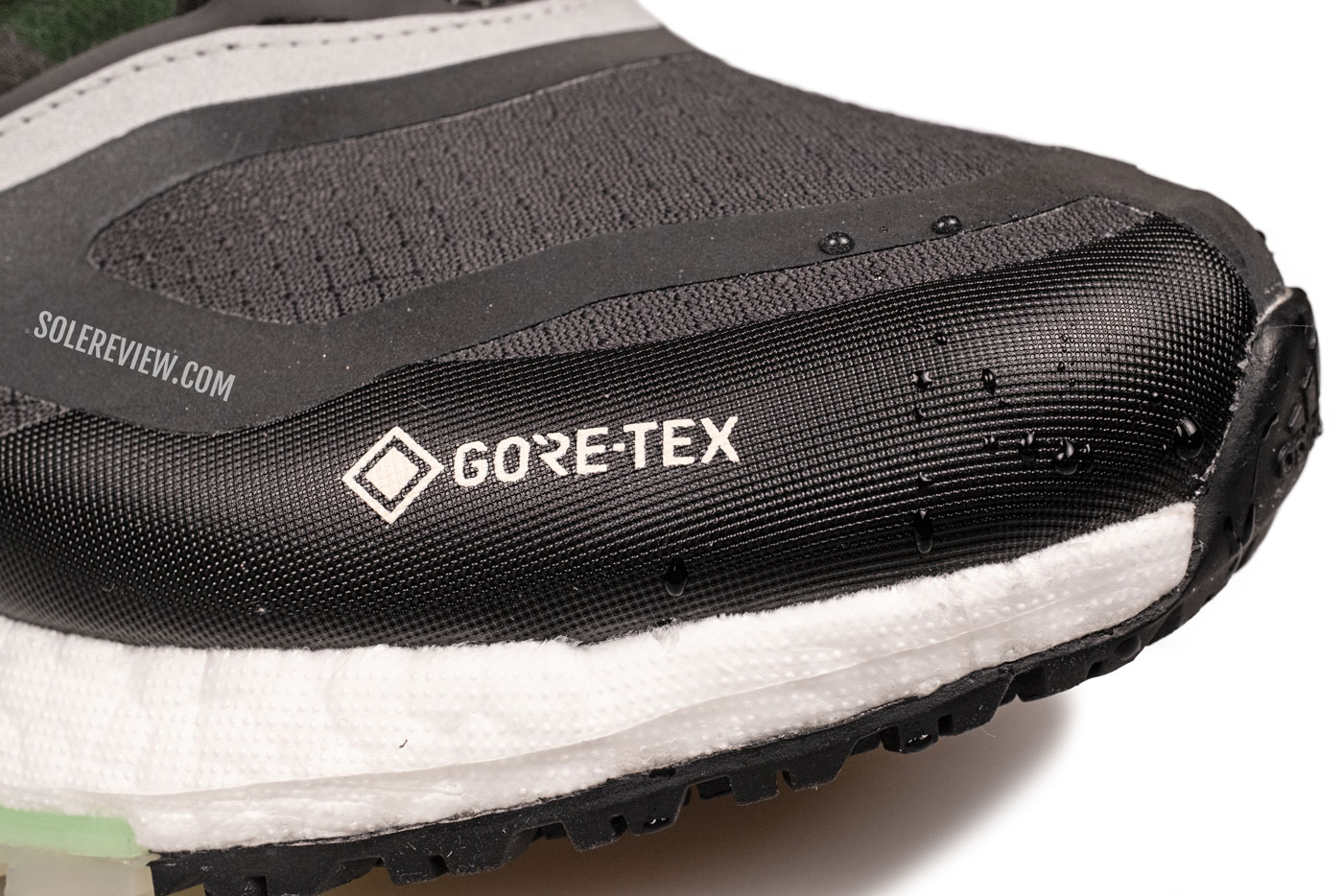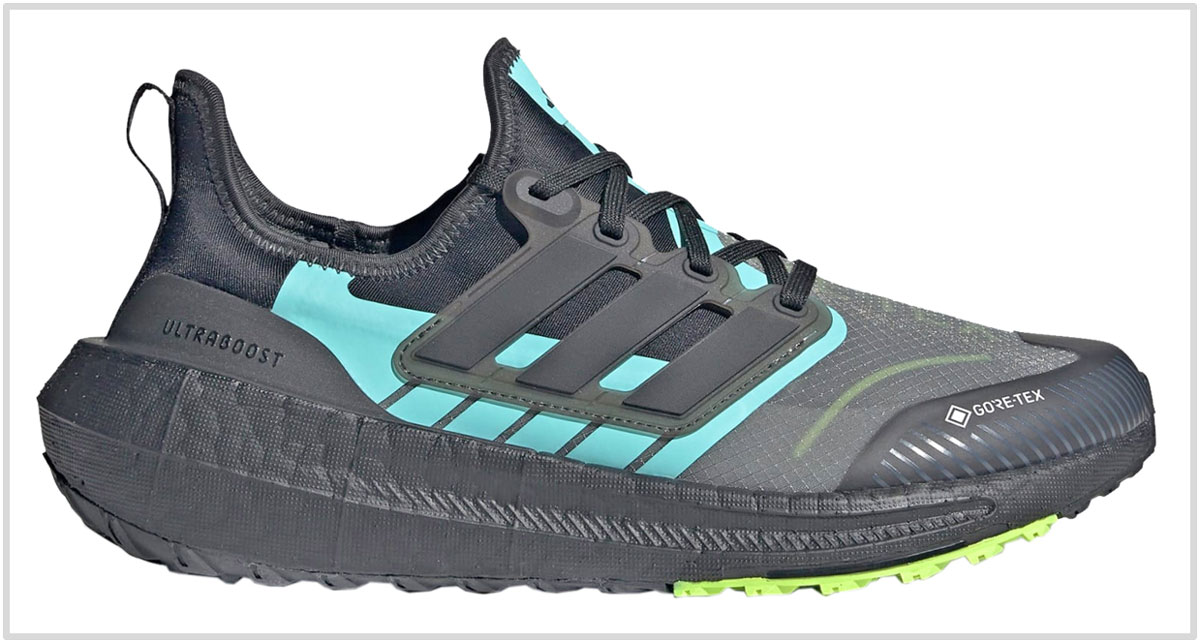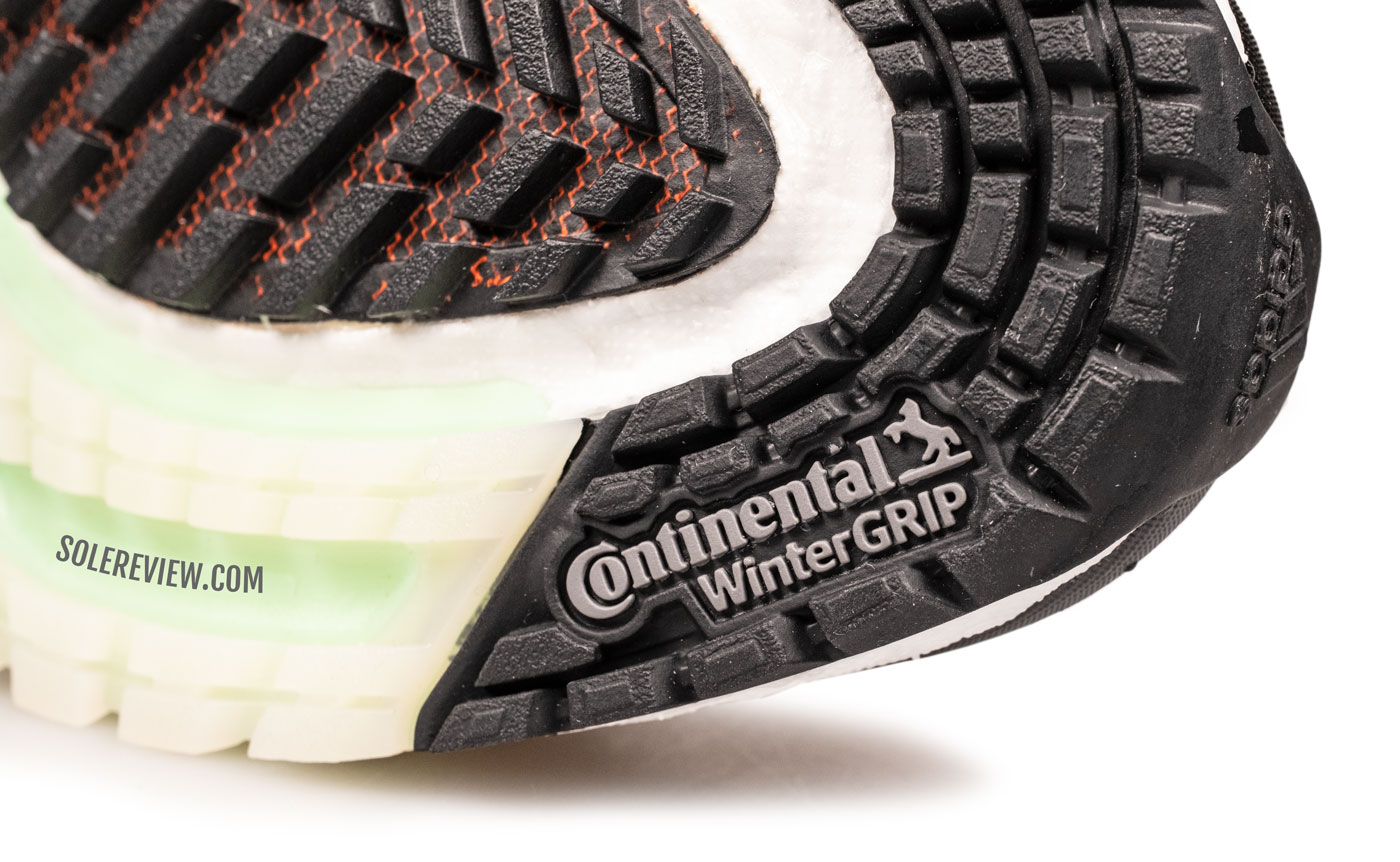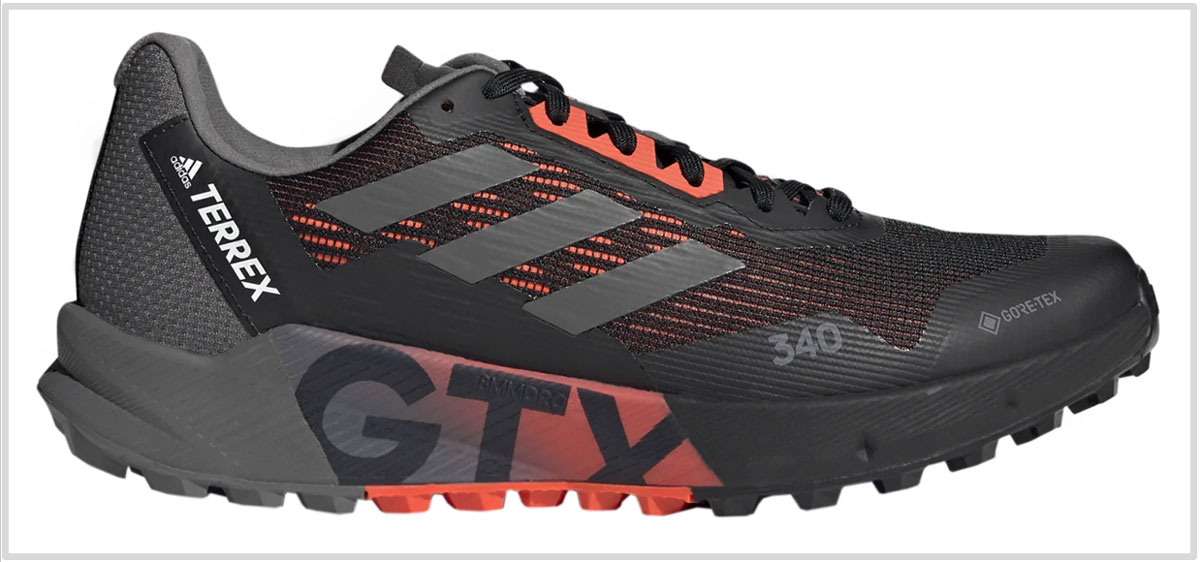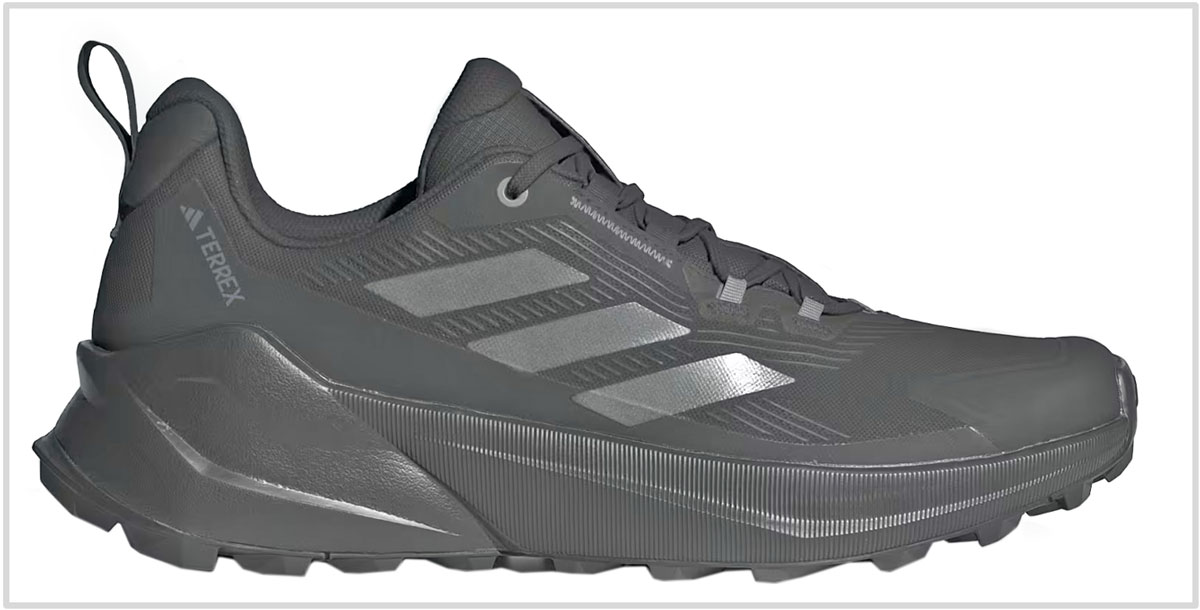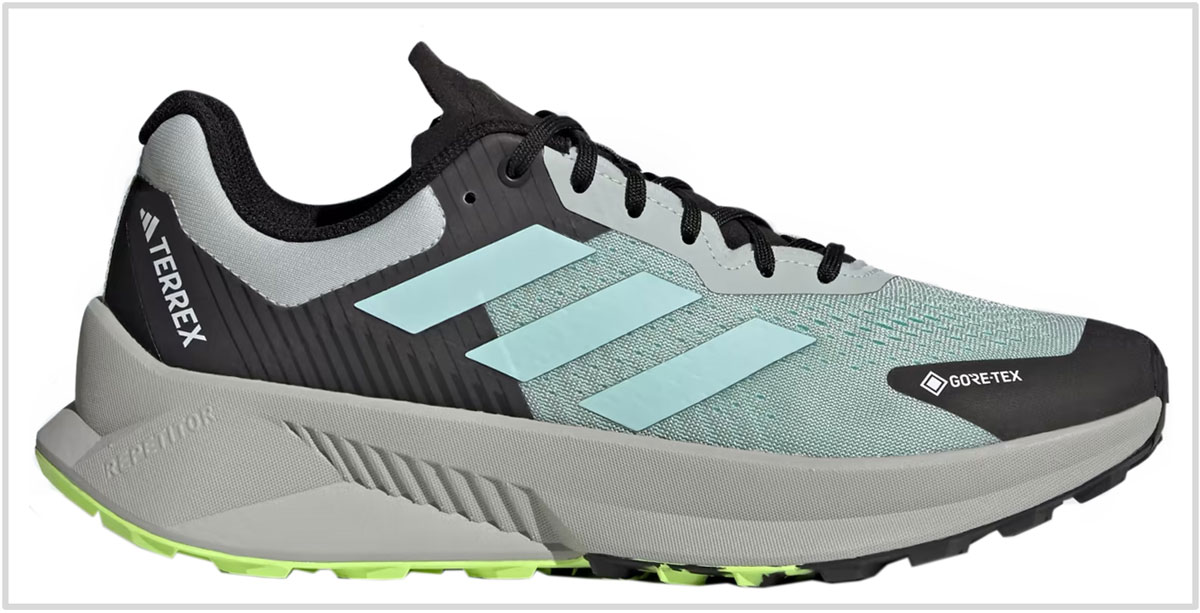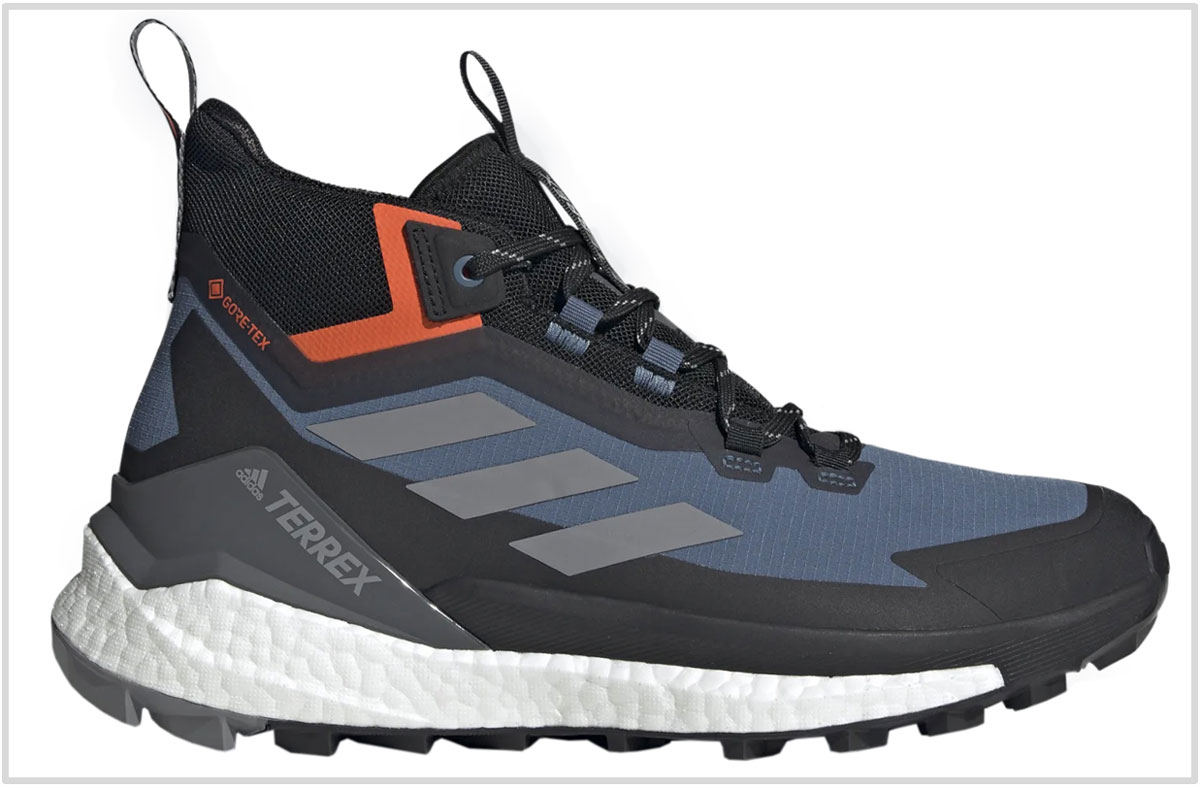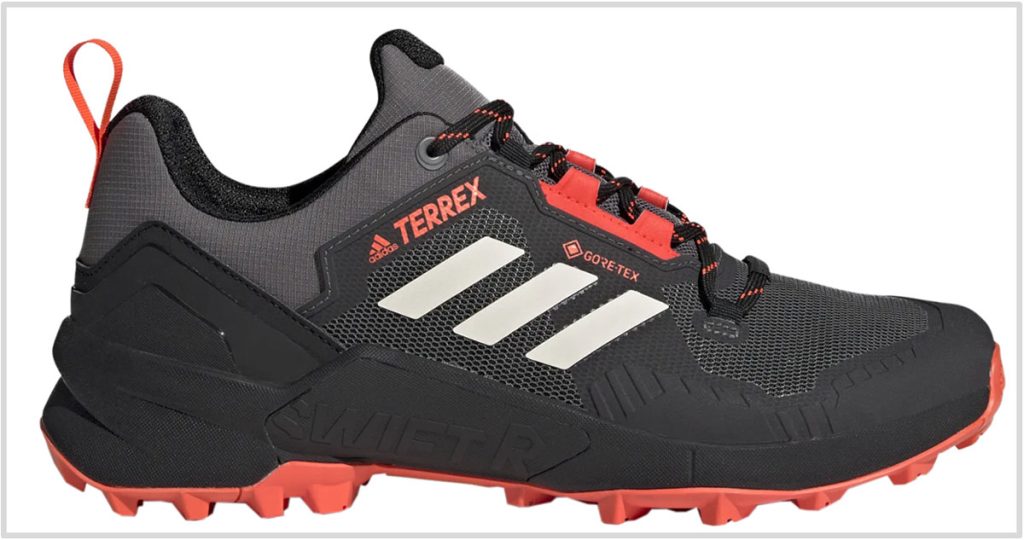This article has been updated with current models for February 2024. The Ultraboost 22 GTX has been replaced with its updated version. The adidas Terrex Trailmaker 2.0 GTX and Soulstride Flow GTX are new additions. The Solarglide 5 GTX has been removed.
In this product guide:
- 1. Factors to consider
- 2. Our pick: Everyday waterproof sneaker: adidas Ultraboost Light GTX
- 3. Waterproof trail running shoe: adidas Terrex Agravic Flow 2.0 GTX
- 4. Affordable waterproof trail trainer: adidas Terrex Trailmaker 2.0 GTX
- 5. Waterproof trail trainer: adidas Soulstride Flow GTX
- 6. Waterproof hiking boot: adidas Terrex Free Hiker 2.0 GTX
- 7. Waterproof hiking shoe: adidas Terrex Swift R3 GTX
Barring its Terrex outdoor line-up, adidas has a limited assortment of waterproof footwear. None of its performance running shoes are sold in a waterproof version; and no, the adidas Ultraboost Light GTX doesn’t count.
The Ultraboost is more a lifestyle sneaker than anything else, and it lacks the versatility of shoes like the Brooks Ghost 15 GTX or Hoka Clifton 9 GTX.
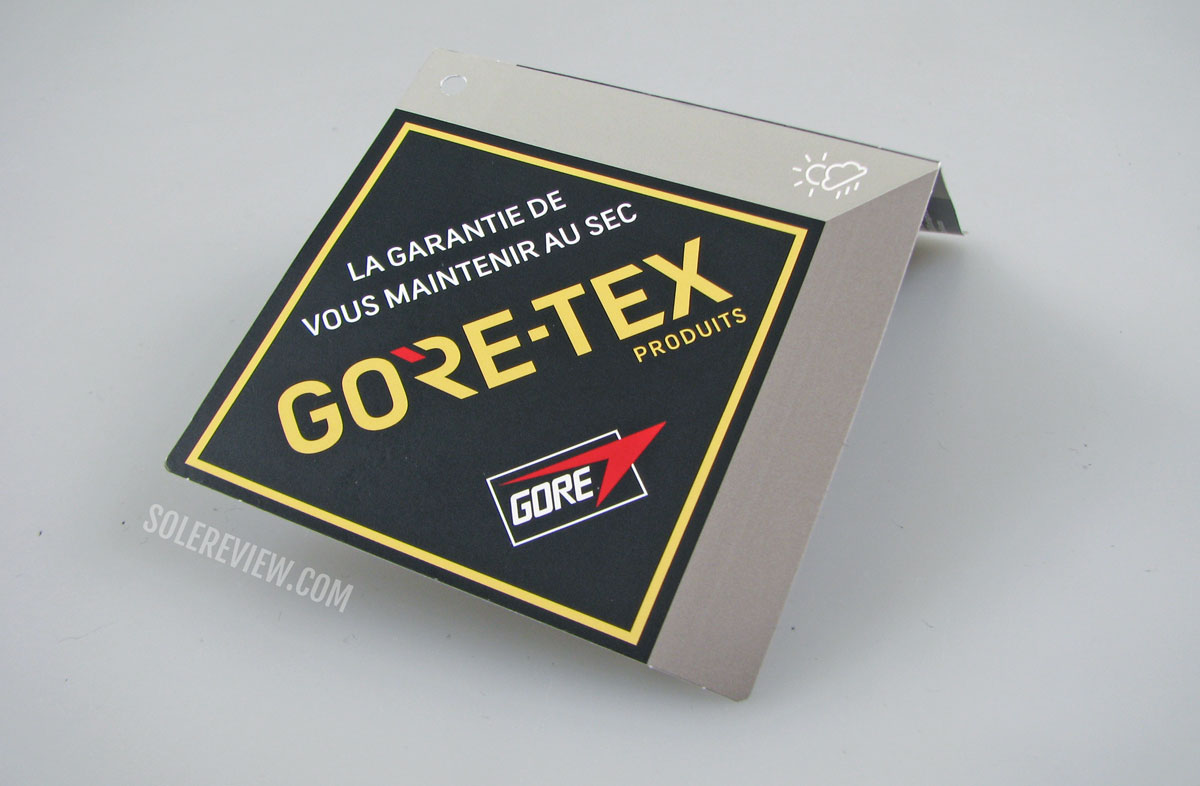
On the bright side, adidas has an excellent assortment of waterproof trail running shoes across diverse price points and performance categories. In this guide, we have the relatively affordable ($100 retail) Terrex Soulstride Flow GTX to the speed-running Terrex Agravic Flow 2.0 GTX.
(Related read: The best waterproof running shoes for men)
Solereview recommends: adidas Ultraboost Light Gore-Tex
The Ultraboost Light is one of adidas’s most popular sneakers, so having a version with a waterproof Gore-Tex upper makes perfect sense. adidas doesn’t give the Ultraboost GTX mere lip service, but also throws in a winter-specific outsole as well.
With this set-up, we get the comfortable Boost midsole of the standard model, but with a weather-ready upper that’s waterproof, reflective, and reasonably well-insulated from the cold.
The outsole is also meant for winter use; a special rubber compound (Continental, of course) has a strong bite on wet surfaces.
In addition to the waterproof Gore-Tex membrane, the ripstop mesh and rubberized layers keep the moisture and slush out. One welcome change from last year’s Ultraboost 22 GTX is the removal of the zipped shroud. The Ultraboost Light’s traditional lacing over the plastic cage is much easier to manage.
The Ultraboost Light is over an ounce lighter than the previous model, thus bringing the weight down to 11.7 ounces for a half pair of US 9. It’s still too bulky to be a versatile performance running shoe.
We’re hoping that adidas will release Gore-Tex versions of the Supernova Rise and Supernova Solution in the second half of 2024.
2) adidas Terrex Agravic Flow 2.0 GTX
The Terrex Agravic Flow 2.0 is a low-profile trail shoe for speed runs. Its 20 mm thick forefoot and 28 mm heel (which results in an 8 mm drop) make the shoe cushioned, yet low to the ground.
There’s no Boost foam used here. A firm foam called ‘Lightstrike’ provides most of the cushioning in this 11.2-ounce trail runner.
Lightstrike is an EVA foam variant that’s also used on the adizero adios 8 and adizero SL. The firm ride helps build up speed on the trail while offering excellent stability.
Though the Agravic Flow 2.0 lacks a rock plate, the firm EVA midsole and Continental rubber outsole protect the feet from the rocks and roots. The wide-spaced 4 mm lugs of the Continental rubber outsole grip over while minimizing clogging.
The sleeved and padded tongue provides secure interior comfort and absorbs the top-down lacing pressure. In the front, the reinforced toe bumper protects the foot from bumps on the trail2
3) adidas Terrex Trailmaker 2.0 Gore-Tex
There aren’t many $100 GTX-fitted running shoes in the market, so the Terrex TrailMaker 2.0 is excellent value for money. It’s worth mentioning that only the all-black Trailmaker is $100; the other colors cost $20 more.
The kit level on the Trailmaker 2.0 punches above its price class. The outsole uses the Continental rubber compound lugs with wide spacing; this way, the Trailmaker 2.0 offers reliable traction while reducing clogging. The firm EVA midsole and transition channel make the ride supportive.
There’s no Boost or Lightstrike Pro on the Trailmaker 2.0’s midsole, so the ride can be harsh over longer (5K+) distances. The forefoot, in particular, is fairly low profile (19 mm), so the lack of cushioning and protection will be felt during a long run.
The upper is well-built for its price. Over the waterproof Gore-Tex membrane is a rugged exterior made of ripstop mesh and fused reinforcements.
4) adidas Terrex Soulstride Flow Gore-Tex
In our opinion, the $160 Terrex Soulstride is priced around $20 higher than it should be. Sure, it has a Continental rubber outsole under a waterproof upper, but so does the cheaper Trailmaker 2.0.
The Soulstride has a couple of things going for it. The midsole stack heights of 32 mm (rear) and 24 mm (front) makes it more cushioned than many other shoes in this guide.
The other factor would be its soft mesh upper and toned-down outsole design. The upper uses spacer mesh rather than scratch-resistant ripstop, so it’s softer on the foot than say, a fully-kitted trail shoe.
The outsole lugs are short (3mm ) and packed closer. This makes the Soulstride a road-trail hybrid with limited outdoor capabilities. The transition channel runs through the forefoot, so the outsole provides only marginal protection from pointy rocks or roots.
In short, the Soulstride makes a strong case as a rugged road running (or walking) shoe that’s also waterproof – thanks to the Gore-Tex membrane.
5) adidas Terrex Free Hiker 2.0 GTX
If we look past its $230 price, the Terrex Free Hiker 2.0 Gore-Tex has many features that a standard hiking shoe lacks. For example, it’s rare to find high-tech cushioning technology like Boost foam on an outdoor shoe.
Most hiking boots have a firm midsole, so here is where the Terrex Hiker 2.0 adds a lot of value to the outdoor shoe ecosystem.
The soft and responsive Boost stack makes the ride extremely comfortable for long-distance hikes. It’s also supported by a firm EVA frame and molded heel counter for support.
The Gore-Tex membrane adds effective waterproofing to the mid-cut upper. The fused overlays on the tightly woven ripstop mesh make the upper durable and protective.
The Continental outsole performs as expected – the widely spaced lugs deliver effective traction and protection. The outsole lugs are not very deep, so the Free Hiker 2.0 is also a good fit for urban environments.
6) adidas Terrex Swift R3 Gore-Tex
The Terrex Swift R3 has an adidas feature that we assumed was lost to time. We’re talking about the ‘Promoderator’ – the adidas name for a midsole stability wedge. Back in 2004-2007, adidas running shoes with a ‘Promoderator’ meant that the midsole had a medial post.
In 2024, firmer medial posts are nearly extinct. The Promoderator on the Swift R3 is not a medial post, but a TPU clasp that hugs the midfoot.
Additional protection comes from the rock plate and Continental rubber outsole with its deep 4.5 mm lugs.
The Lightstrike EVA midsole (of the adizero SL, Boston 12, and adios 8 fame) has heel and forefoot stack heights of 25 mm and 15 mm. This setup provides sufficient ride comfort, yet is stable enough for uneven surfaces.
The waterproof Gore-Tex upper doesn’t seem like much from the outside, but it has a clever trick or two. The first row of lacing is set wide apart for a customizable fit. The speed loops also make the lacing process smooth.
In the front, a welded toe bumper protects the foot from the inevitable bumps and nicks.
Do you own any of these shoes? Improve this review by sharing your insights – submit a review here.

